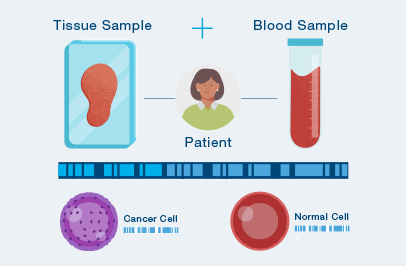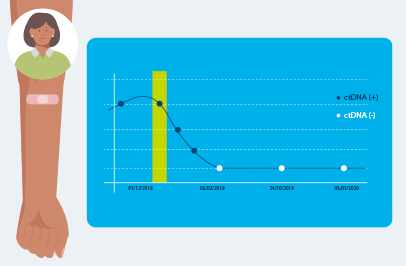Is MRD testing right for you?
If you have been diagnosed with a solid tumor cancer, you likely have many lingering questions like “Is cancer still lurking?” or “Is the cancer coming back?” or “Is the treatment working?” It is important that you discuss with your care team what tools are available to help answer these important clinical questions which may help enable earlier intervention.

What is Signatera™?
Signatera TM Residual Disease test is highly sensitive, custom designed ctDNA test, specifically designed to determine:
- If there are signs of cancer remaining in the body after surgery or definitive therapy
- To determine if you will benefit from additional therapy after surgery
- To determine if the treatment (e.g., chemotherapy, radiation) is working
- To find out if the cancer may be recurring, earlier than standard of care tools
How to have a conversation with your physician about MRD testing
Patients often have questions regarding their care after a cancer diagnosis or definitive treatment. You may want to discuss with your care team the plan to assess treatment response, and how to watch for signs that the cancer may be recurring. Signatera™ has been developed to detect molecular residual disease (MRD) by looking for the distinct tumor DNA ‘signature’ in each patient, to help detect the earliest signal of cancer recurrence. Since Signatera™ is personalized, using your own tumor tissue, it is highly sensitive and optimized to identify disease at the molecular level, making it a powerful source of information to help guide future care decisions.
My doctor ordered Signatera™ to help monitor my treatment journey. What’s Next?
Once testing is completed, your oncologist will reach out to you to discuss your results. The first test result may take ~ 3-4 weeks; subsequent orders will only take 7-10 days. Depending on your type of cancer, close surveillance may be critical to help inform the effectiveness of your treatment and/or to help inform any future therapy. Signatera™ is optimized when used serially over time (generally every 3 months through a simple blood draw) so your physician or care team may discuss with you a cadence for ordering your testing, along with any other surveillance tools to help monitor for recurrence and inform any changes in your treatment plan.
How Signatera™ Works: a personalized and tumor informed approach to MRD surveillance

A one-time analysis of both blood and tissue determines your unique set of tumor mutations.

The MRD test is custom-built and personalized just for you, using your own tumor tissue.

Signatera™ MRD test detects small fragments of ctDNA each time it is ordered as part of your routine follow-up blood tests. Patients who are ctDNA positive by Signatera are more likely to relapse.
How Signatera™ helps patients through their treatment
Living scan to scan can sometimes create anxiety for patients. The question of relapse looms in the back of their mind: Did the treatment work? Is the cancer coming back?
Through shared decision making, patients can work closely with their care team to incorporate Signatera™ into their treatment plan to provide additional information for confident decision making. Listen to Brooks Bell tell her story of how she achieved peace of mind between scans using Signatera™.
Empowering the patient through Signatera™
Hear how Trevor is taking a more proactive approach with his health through Signatera™.
Trevor
Living with colorectal cancer
Signatera™ is validated in multiple cancer types

I have colorectal cancer
If you have been diagnosed with colorectal cancer, learn more how to identify residual disease and detect relapse sooner with Signatera™ MRD testing

I am on immunotherapy
If you are undergoing immunotherapy and want to know how the Signatera™ MRD test can help monitor the effectiveness of your treatment

I have breast cancer
If you have been diagnosed with breast cancer and want to learn more detecting relapse earlier.
Patient Resources
Why Signatera™?
Signatera™ is a unique blood test, personalized for each patient using their own tumor tissue. It is used to detect cancer release earlier and treatment response better than standard of care tools.
A doctor may order Signatera™, along with other routine follow up exams to determine:
- If there are any signs of cancer remaining in the body
- If the treatment (ie chemotherapy, radiation, immune checkpoint inhibitors) is working
- If the cancer may be coming back
Understanding your Signatera™ test results
Your test results will either be positive or negative for the presence of tumor DNA in your blood. Your doctor will receive the test report and will be able to discuss your results and answer questions. These results provide additional insights and may help guide your treatment plan.
IMPORTANT: Negative ctDNA results may change over time. A negative MRD test result doesn’t guarantee that cancer will never be detected in the future. This is why ongoing monitoring with the Signatera™ test, as directed by your doctor, is recommended—for early detection of residual disease
Negative result
If you have metastatic cancer, a negative result may mean that your treatment was able to decrease the amount of cancer cells to undetectable levels, meaning the treatment has been effective.
Positive result
Knowing earlier matters
Each person’s cancer is as unique as their fingerprint. Signatera™ is a custom-designed ctDNA test that is personalized to each patient’s set of tumor mutations and can identify earlier than traditional tools that may indicate cancer is still present. Knowing this information can help you have a more informed discussion with your doctor regarding your treatment journey.
Signatera™ is covered by Medicare for monitoring disease progression, disease recurrence, or relapse for patients with:
- Stage II-IV and oligometastatic colorectal cancer (CRC) in the adjuvant and recurrence monitoring settings
- Muscle invasive bladder cancer (MIBC) in the adjuvant and recurrence monitoring settings
- Stage II-IV breast cancer in the neoadjuvant setting, regardless of subtype
- Stage IIb and higher breast cancer in the adjuvant and recurrence monitoring settings
- Stage II-IV ovarian, fallopian tube, or primary peritoneal cancer in the adjuvant and recurrence monitoring settings
- For monitoring of response the immune-checkpoint inhibitor (ICI) therapy for patients with any solid tumor




